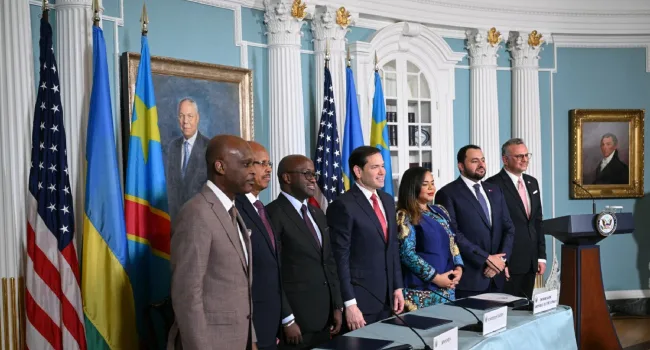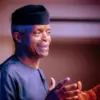Rwanda and the Democratic Republic of Congo (DRC) signed a landmark peace agreement on Friday aimed at ending a bloody conflict that has claimed thousands of lives. The deal, signed in Washington, D.C., was brokered by the United States, Qatar, and the African Union, and witnessed by U.S. Secretary of State Marco Rubio.
The two nations pledged to withdraw support for armed groups fueling violence in the mineral-rich eastern Congo, marking a significant, though cautious, step toward stability in a region long plagued by conflict.
“This agreement gives people a chance to dream again — to hope for a better life,” Rubio said at the signing ceremony. He acknowledged that “more work needs to be done” to ensure lasting peace.
The deal follows a surge in fighting earlier this year, when the M23 rebel group — an ethnic Tutsi militia widely believed to receive backing from Rwanda — captured vast territories in eastern DRC, including the strategic city of Goma. While the agreement does not explicitly mention M23’s territorial gains, it calls on Rwanda to halt what it describes as “defensive measures.”
Rwanda has repeatedly denied direct support for M23, instead insisting on the disbandment of the Democratic Forces for the Liberation of Rwanda (FDLR), an armed Hutu group linked to perpetrators of the 1994 Rwandan genocide. The agreement includes a clause calling for the “neutralization” of the FDLR.
Rwandan Foreign Minister Olivier Nduhungirehe said, “The first order of business is to implement the concept of operations for the neutralization of the FDLR, to be accompanied by a lifting of Rwanda’s defensive measures.” He emphasized that this was based on “an irreversible and verifiable end to state support for the FDLR and affiliated militias.”
Congolese Foreign Minister Therese Kayikwamba Wagner underscored that the deal reinforces respect for sovereignty and international norms. “By signing this agreement, we reaffirm a simple truth: Peace is a choice — but also a responsibility to uphold international law, protect human rights, and respect the sovereignty of states,” she said.
Trump claims credit, eyes mineral wealth
Former U.S. President Donald Trump, who played a key role in facilitating the talks, has taken personal credit for the agreement. Speaking to reporters, Trump said he would host both ministers at the White House later on Friday and noted that the U.S. would secure “a lot of mineral rights from the Congo” as a result of the deal.
The DRC is home to vast reserves of critical minerals, including cobalt and lithium — key components in electric vehicles and high-tech industries. Trump’s comments come amid intensifying global competition, particularly with China, for control over these vital resources.
In an uncharacteristically candid admission, Trump also acknowledged his limited understanding of the historical context. “I’m a little out of my league on that one because I didn’t know too much about it. I knew one thing — they were going at it for many years with machetes,” he said, appearing to allude to the 1994 Rwandan genocide, in which over 800,000 people were killed, mostly Tutsis.
Despite the celebratory tone in Washington, the deal has drawn sharp criticism. Dr. Denis Mukwege, Congolese Nobel Peace Prize laureate and internationally renowned gynecologist, condemned the agreement as a dangerous concession.
“This amounts to rewarding aggression, legitimizing the plunder of Congolese resources, and compelling victims to surrender justice in exchange for a fragile peace,” he said in a statement issued ahead of the signing.
Mukwege argued that the deal favors Rwanda and the United States while undermining Congolese sovereignty and justice.
Both Kigali and Kinshasa have recently sought closer ties with Washington. The DRC reportedly offered a minerals deal modeled after a previous Trump-era agreement with Ukraine. Rwanda, meanwhile, is in talks to accept migrants deported from the United States — a cornerstone of Trump’s immigration agenda.
Rwanda had previously struck a similar migration agreement with the United Kingdom, but it was cancelled following the Labour Party’s victory in last year’s general elections.
The peace accord is seen as a high-stakes effort to stabilize one of the most volatile regions in Africa. Whether it leads to lasting peace — or merely reshapes regional power dynamics — remains to be seen.
AFP


